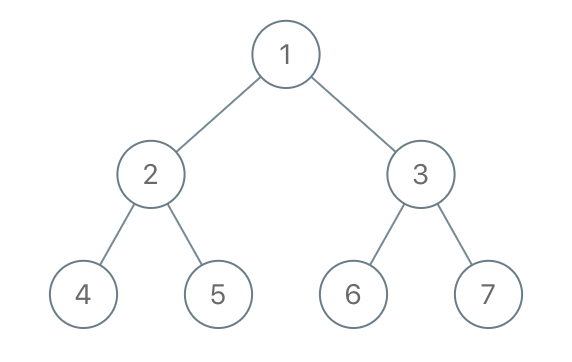题目地址:https://leetcode.com/problems/delete-nodes-and-return-forest/
题目描述
Given the root of a binary tree, each node in the tree has a distinct value.
After deleting all nodes with a value in to_delete, we are left with a forest (a disjoint union of trees).
Return the roots of the trees in the remaining forest. You may return the result in any order.
Example 1:

Input: root = [1,2,3,4,5,6,7], to_delete = [3,5]
Output: [[1,2,null,4],[6],[7]]
Constraints:
1、 Thenumberofnodesinthegiventreeisatmost1000.;
2、 Eachnodehasadistinctvaluebetween1and1000.;
3、to_delete.length<=1000;
4、to_deletecontainsdistinctvaluesbetween1and1000.;
题目大意
删除一棵二叉树中的所有值出现在to_delete中的节点。
解题方法
递归
参考了lee215大神的答案。看到二叉树的题就想到递归呀!
一个节点被删除时有以下几个情况:
1、 如果该节点是根节点,形成左右两个子树,此时递归左右子树;
2、 如果该节点不是根节点,那么需要修改其父节点指向自己的指针为空,并且递归左右子树;
一个节点一旦被删除,那么其左右孩子就是新的树的根节点。 如果一个节点是根节点,并且不被删除的情况下,才会放入结果中。
C++代码如下:
/**
* Definition for a binary tree node.
* struct TreeNode {
* int val;
* TreeNode *left;
* TreeNode *right;
* TreeNode(int x) : val(x), left(NULL), right(NULL) {}
* };
*/
class Solution {
public:
vector<TreeNode*> delNodes(TreeNode* root, vector<int>& to_delete) {
vector<TreeNode*> res;
helper(root, true, res, to_delete);
return res;
}
void helper(TreeNode*& node, bool isRoot, vector<TreeNode*>& res, vector<int>& to_delete) {
if (!node) return;
bool isDel = delCurNode(node, to_delete);
helper(node->left, isDel, res, to_delete);
helper(node->right, isDel, res, to_delete);
if (isRoot && !isDel) {
res.push_back(node);
}
if (!isRoot && isDel) {
node = nullptr;
}
}
bool delCurNode(TreeNode* root, vector<int>& to_delete) {
for (int val : to_delete) {
if (root->val == val) {
return true;
}
}
return false;
}
};
1 2 3 4 5 6 7 8 9 10 11 12 13 14 15 16 17 18 19 20 21 22 23 24 25 26 27 28 29 30 31 32 33 34 35 36 37
参考资料:https://leetcode.com/problems/delete-nodes-and-return-forest/discuss/328853/JavaC%2B%2BPython-Recursion-Solution
2022
DDKK.COM 弟弟快看-教程,程序员编程资料站,版权归原作者所有
本文经作者:负雪明烛 授权发布,任何组织或个人未经作者授权不得转发